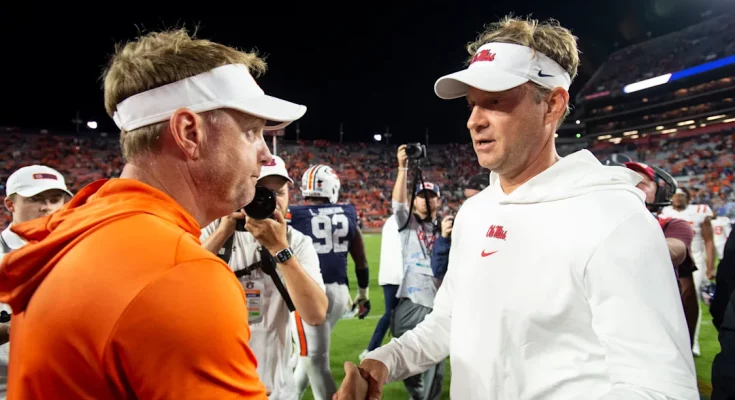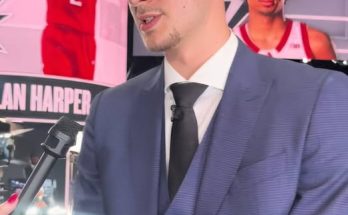Lane Kiffin has never been one to shy away from stirring the pot, and his latest return to X (formerly Twitter) was no exception. The Ole Miss head coach couldn’t resist trolling a fellow SEC program after the Auburn Tigers unveiled a bizarre new method for play-calling—one that immediately caught the attention of college football fans and analysts alike.
Auburn’s new approach, which involves using large, colorful cue cards held up by staffers on the sideline, was revealed in a social media post by the program. The cards feature a mix of images, numbers, and symbols, seemingly designed to relay plays to the offense without relying on traditional signals or wristbands. While innovative, the method quickly became a subject of ridicule online, with many questioning its practicality and effectiveness in the fast-paced environment of SEC football.
Enter Lane Kiffin, the king of college football trolling. Never one to miss an opportunity to poke fun at an opponent—or even an ally—Kiffin took to X with a characteristically sarcastic response. Though he didn’t mention Auburn by name, the implication was clear. His tweet, which has since gone viral, read: *”Love the new play-calling system. Very subtle. Can’t wait to see it in action.”* The post was accompanied by a series of laughing emojis, ensuring that everyone understood the jab.
Kiffin’s history with social media antics is well-documented. Whether he’s roasting rival coaches, poking fun at his own program, or simply embracing his role as college football’s resident provocateur, the Ole Miss coach has mastered the art of engagement in the digital age. His latest dig at Auburn’s unconventional strategy is just another example of why he remains one of the most entertaining figures in the sport.
But beyond the humor, Kiffin’s tweet raises an interesting question: How much of an advantage—or disadvantage—does Auburn’s new system actually provide? On one hand, the use of visual cues could simplify communication in loud road environments where verbal play-calling might be drowned out. On the other, the sheer size and obviousness of the cards could make it easier for opposing defenses to decipher Auburn’s intentions. If teams like Ole Miss catch on quickly, the Tigers might find themselves at a strategic disadvantage.
This isn’t the first time a team has experimented with unconventional play-calling methods. Over the years, programs have tried everything from giant posters to elaborate hand signals to sideline tablets. Some innovations stick, while others fade into obscurity after proving too gimmicky or impractical. Auburn’s approach appears to fall into the latter category—at least in the eyes of critics like Kiffin.
Of course, the Tigers’ coaching staff likely has a rationale behind the system. Head coach Hugh Freeze, known for his offensive creativity, may believe the cards reduce miscommunication and streamline the play-calling process. If executed well, it could give Auburn an edge in high-pressure situations. But if opponents crack the code early, the Tigers could be forced to abandon the experiment mid-season.
Kiffin’s playful jab also underscores the broader culture of the SEC, where rivalries are fierce and even the smallest details can become bulletin-board material. Coaches in the conference are always looking for psychological edges, whether through mind games in press conferences or subtle social media digs. Kiffin, in particular, has turned trolling into an art form, using humor to keep opponents—and fans—on their toes.
Interestingly, Kiffin’s own play-calling methods at Ole Miss have been anything but conventional. Known for his aggressive, fast-paced offensive schemes, he has often relied on tempo and misdirection to keep defenses guessing. His willingness to embrace analytics and unconventional strategies has made the Rebels one of the most exciting teams to watch in college football. So while he may be laughing at Auburn’s cue cards, he’s no stranger to innovation himself.
The reaction from fans has been predictably mixed. Some have sided with Kiffin, mocking Auburn’s system as overly complicated or easily decipherable. Others have defended the Tigers, arguing that if it works, it doesn’t matter how unconventional it looks. A few have even suggested that Kiffin’s tweet might backfire—if Auburn’s offense thrives with the new method, the joke could end up being on him.
Regardless of how the play-calling experiment plays out, one thing is certain: Lane Kiffin will continue to be a must-follow on social media. His ability to blend humor, rivalry, and football insight makes him one of the sport’s most engaging personalities. And as long as opponents keep giving him material—like Auburn’s giant cue cards—he’ll keep delivering the laughs.
In the end, the success or failure of Auburn’s new system will be determined on the field. If the Tigers put up big numbers and win games, critics like Kiffin will have to eat their words. But if the cards lead to confusion, turnovers, or defensive breakdowns, the jokes will only get louder. Either way, the SEC’s never-ending drama ensures that even something as mundane as play-calling can become must-see content.
As for Kiffin, his return to X was a reminder of why college football fans love him—he’s unpredictable, unfiltered, and always entertaining. Whether he’s trolling opponents, hyping up his team, or just having fun with the sport, he understands that football is as much about personality as it is about strategy. And in an era where social media drives fan engagement, that’s a winning formula.
So as the season approaches, all eyes will be on Auburn’s sideline to see if their cue-card experiment pays off. And you can bet that if it doesn’t, Lane Kiffin will be ready with another perfectly timed tweet. After all, in the SEC, the games aren’t just played on the field—they’re fought in the trenches of social media, too. And when it comes to that battle, Kiffin is always one step ahead.



